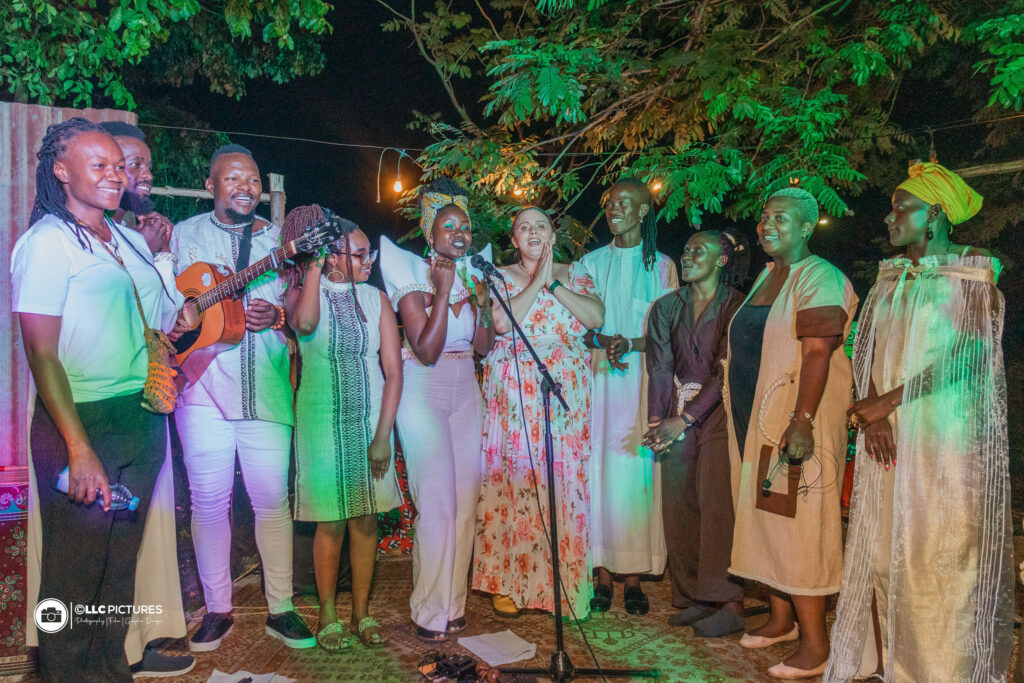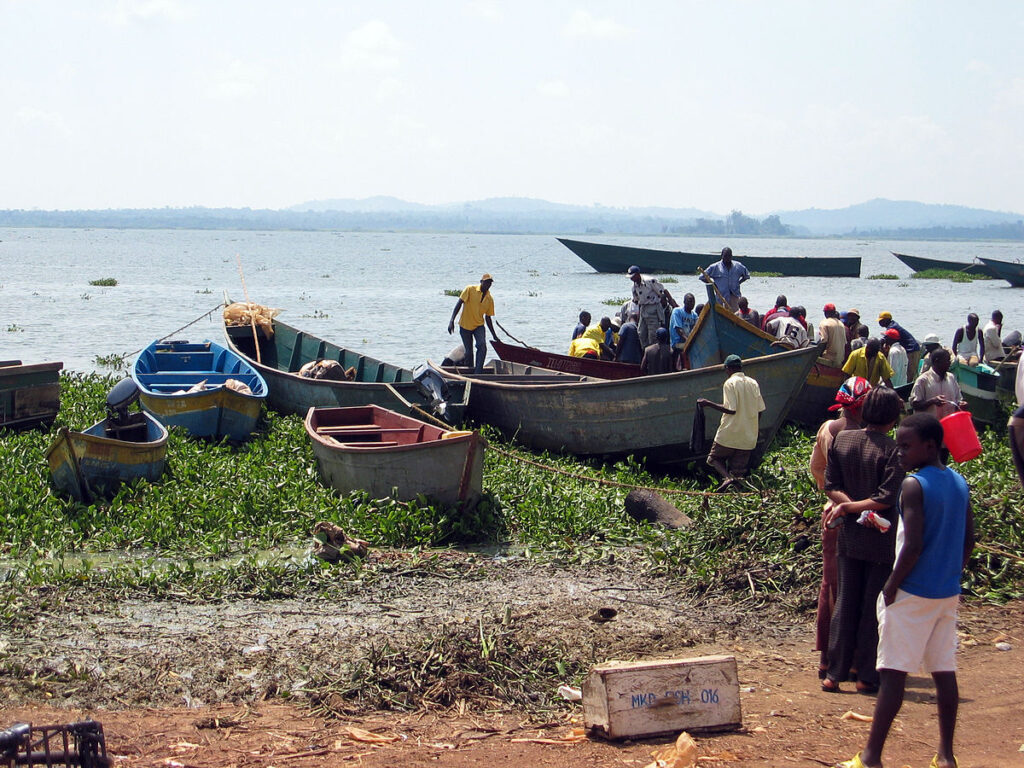For ages, Lake Victoria, the world’s second-largest fresh water lake has been choking due to aggravated human-related (anthropogenic) activities thus endangering aquatic life.
Spirited efforts to save the soul of the lake’s ecosystem continue to gain traction as many environmentalists remain resilient on the course.
On a positive note, the number of voices of reason continues to emerge to create awareness to make people think about their actions on Nam Lolwe and trigger lasting change.
It is worth noting that massive pollution has led to a high reduction in fish stocks, perennial emergence of water hyacinth and lake transport interference.
Climate change and biodiversity loss have exacerbated food insecurity and poverty from droughts and floods, loss of lives and properties from extreme weather, social unrest and the ever-spiralling migration patterns.
Music for environmental advocacy
Music has been used as a therapy to help people learn to securely communicate their feelings by using verbal and non-verbal cues to improve their emotional behaviour.
To add some flare towards environmental conservation, Laura Ong’ayo, a singer, songwriter, and producer wades in to inspire the populace to be part of that change.
“I embraced the role of an activists in Climate Change, Mental Health and Social Justice issues. They are based on the challenges I faced in my younger years more so with where I grew up and I wanted to tell my own story,” she says.
She adds that the continued interference with the lake ecosystem is a worrying trend that if left unchecked threatens the well-being of the current and future generations.
I want my voice to be heard, encourage other people to speak through storytelling, music and dance to change the narrative of those generations that are coming after me
Liboi
The Nairobi-based artist with the stage-moniker Liboi is in love with African Contemporary music – a traditional music blended with popular African genres.
“I want my voice to be heard, encourage other people to speak through storytelling, music and dance to change the narrative of those generations that are coming after me,’’ she says.
“As a woman,” she continued, “I want to advocate for our rights and be able to talk about the ills which are happening in the society.”
“I grew up in Kariobangi North-Nairobi and it’s very close to Korogocho slums. There were lots of crime issues like extrajudicial killings, and inequality in terms of opportunities given to women as opposed to men,” she opened up.
To address these anomalies, she decided to become a musician in 2014, to tell the truth about the good things in the area. She has embraced and concentrated on creative, music and film spaces to become a storyteller and to express herself in different mediums.
“I started as a filmmaker in a school called Case Media Resource Centre in Kariobangi where I studied film, videography, photography and editing. Right next to it is a vocal and music centre where I used to go and listen to bands like Sarabi, Dela, and Sauti Sol,’’ she recounted with a peal of hearty laughter.
Liboi was influenced a lot by her father who was a DJ who used to play a lot of traditional music in the house and his workplaces.
Her advocacy roles, she stresses, are meant to create opportunities for other young women so that they may not be able to go through the challenges she underwent.
“I have always striven to bring about change by constantly questioning the human conscience to improve the human experience,’’ she clarified.

Kanda la ziwa
Liboi is on this journey with a group of 10 independent and amazing creative artists from Nairobi who came on a mission to let Lake Victoria breathe again.
Through the Kanda La Ziwa Creative Camp by NAAM Festival, they champion preserving and conserving the lake’s ecosystems by showcasing their prowess through visual arts, poetry and storytelling.
Kanda La Ziwa is a co creation platform and lakeside peoples meeting initiative of the NAAM Festival under the #JusticeforLakeVictoria campaign that uses art as an advocacy tool while also empowering artists through skills sharing and knowledge transfer and promoting the understanding of the role of art in the society.
This year, through the support of HEVA Fund and Goethe Institute, it hosted a 10 days residency with Makadem, Liboi, Pungulu Pangala the story teller and other artists from Kisumu.
Christened “Festival within a Festival,” the main event which began on May 24 was supported by the French government through the Creation Africa Kenya Project, Hi Stage Program.
The festival was a side gig to be hosted as a precursor to Festival of Arts and Culture (FESTAC) and observation of the Africa week.
“We believe the lake is a regional symbol of our black unity thus the festival within a festival tag during the now postponed FESTAC,” said Dave Ojay, the Curator, Kanda La Ziwa Creative Artists Residency and festival Director.
“It is another festival within the Black and African Festival of Arts Culture (FESTAC), which is a Pan-African Festival that celebrates, preserves, and promotes African culture, fostering dialogue, together, unity and trade within the continent and among the African diaspora,” Liboi explained.
The Kanda La Ziwa festival helps the population to think about how to create spaces and exist with nature.
The artists serenaded the revelers with a seven-day show-stopping performance in one of the hotels dotting the lake shores.
We can’t pretend not to care about Climate Change because it’s in our day-to-day activities. It matters whether there is sunshine or rainfall, and we need to pay a lot of attention to the City Greening
Liboi
She further notes that Kanda has workshops with different artists from various fields of art coming to change the narrative and advocate for Climate Justice.
“Art is a very powerful tool which we have been crafting as artists to tell the truth. We also hold collaborative sessions where we learn and co-create to come up with new and unique pieces. This has borne an Anthem for Lake Victoria,’’ revealed the Kenyatta University Journalism graduate.
They are putting more emphasis on Lake Victoria as it unites different countries in East Africa. Liboi reiterates that Nam Lolwe is part of our culture which easily connects different people.
“It needs to be cleaned up as the climate changes every other day. The mother nature is very angry and we were linking it to mental health. Unlike in the yesteryear human beings are not taking care of the environment, but are busy polluting the lake, killing fish and destroying our homes,’’ Liboi decried.
She explains that people can identify with Lake Victoria as it is an important asset which before the colonialists possessed different cultural names like; Nalubale ( Uganda), Nam Lolwe (Kenya) and Nyanza (Tanzania).
“We have rolled out similar activities in Nairobi where we ask ourselves how floods, losing our homes, businesses and income affect us mentally. In Kisumu, when we were driving towards Dunga Beach, we saw that floods inundated so many houses and business premises,’’ she observed.

Major threats to nature
According to the Living Planet Report(LPI) jointly published by WWF and the Zoological Society of London (ZSL) Institute of Zoology in 2022, land-use change is still the biggest current threat to nature, destroying or fragmenting the natural habitats of many plant and animal species on land, in freshwater and the sea.
The LPI titled “Building A Nature-Positive Society” indicates that globally the freshwater migratory fish shows an average decline of 76 percent between 1970 and 2016, with habitat loss and modifications, in particular barriers to migration routes, accounting for around half of the treats to these populations.
The Earth, the study reveals, has already warmed by 1.2 degrees Celsius since per-industrial times. It fears that unless we limit warming to less than 2oC, and preferably 1.5oC, climate change is likely to become the dominant cause of biodiversity loss and degradation of ecosystem services in the coming decades.
Affirming this stance, Kenya Marine and Fisheries Research Institute (KMFRI) Fresh Water Research Director, Christopher Aura revealed that the loss experienced in Lake Victoria is attributed to pollution, and high population density, and increased fishing pressure.
“Over 60 percent of fish production in Kenya and 1 percent of captured fish globally come from Lake Victoria, with aquaculture and marine posting 14 percent and 17 percent respectively,’’ Aura revealed in a virtual presentation to a battery of journalists in a previous function.
According to Aura, KMFRI’s April 2022 reconstructed data, shows an increasing trend of fishers’ efforts into the lake estimated at over 40,000.
Out of this figure, 1,000 are women, 15, 000 boats(crafts), over 5,000 cages, and use of illegal nets from 2014. This, however, has led to a decline in how much each fisherman takes home (Annual Catch Per Unit Effort).
Aura indicated that the fish kill phenomenon is due to eutrophication, which is the nutrient enrichment, contamination, or contamination which is coming from outside and inside the lake.
The E-Stage program which began in October 2023 supports artists in Kenya to take their ideas on tour within the country to five different locations based on PACIC -the Cultural Art Bases in Kenya.
In partnership with PACIC, the group artists have come up twice, and are determined to take their projects to Kisumu, Nairobi, Mombasa, Nakuru and Lamu.
In addition, Liboi is in a collaborative project with Wakio Omzenge who is a storyteller, actor, voice actor, film director and theatre performer. Maulid Owino features as a contemporary dancer.
In Nairobi, they were mainly focusing on mental health because it is very rapid(cases) in the area.
“Now we have moved to Kisumu yet still dealing with mental health but by bringing the aspect of Climate Change that affects our mental state. When we go to Mombasa, we will change the context a bit to fit the location,@ she said.
The Creatives who have been invited to be a part of Kanda La Ziwa are also being mentored on Branding and Financial Knowledge. It gives them a direction with experienced facilitators in the industry who share knowledge with the young people.
Marco Lambertini, Director General WWF International avers that a nature-positive future needs transformative shifts in how we produce, we consume, how we govern, and what we finance by 2030 worldwide. It will bring countless benefits to human and economic well-being, including to our climate, food and water security.
“We can’t pretend not to care about Climate Change because it’s in our day-to-day activities. It matters whether there is sunshine or rainfall, and we need to pay a lot of attention to the City Greening,’’ Liboi advises.
